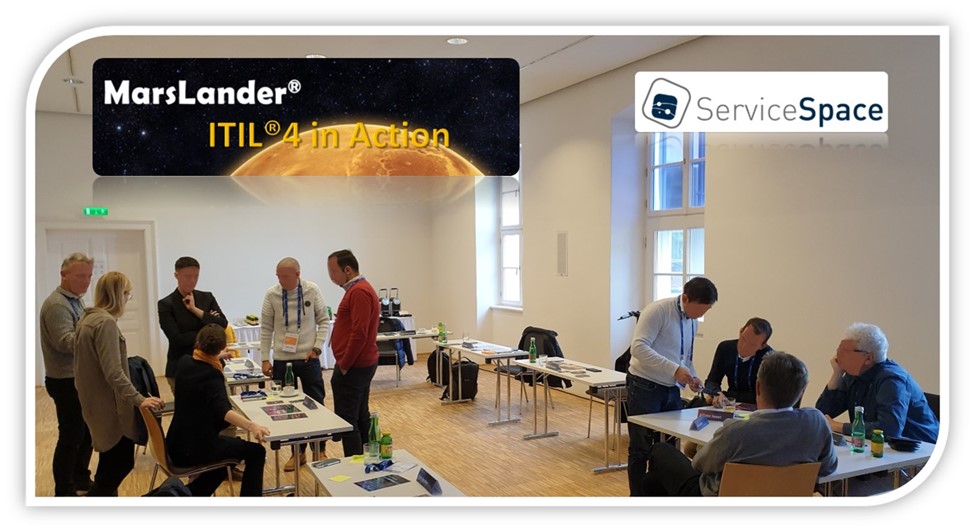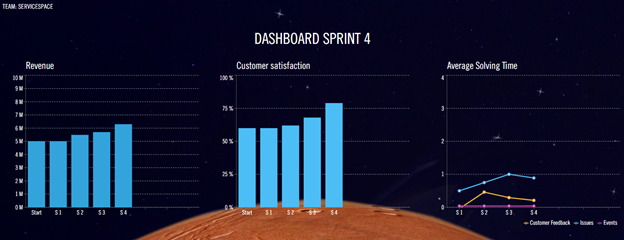From Theory into Practice with MarsLander
<BEEP>
Sagen Sie es weiter:
Mission Log: Stardate 08 November 2021. ‘T Minus 2 hours and counting….’
‘Two hours till launch of the ServiceSpace MarsLander mission’ thought the Mission director sipping his coffee in Vienna. ‘There is no wind, moderate grey skies. I am optimistic about the launch.’
‘It is funny’ thought the Mission Director ‘It has taken me 40 years to realize what makes our missions successful. It has been staring me in the face – literally. It isn’t our technology, or our documented processes and practices. It is our people and how they interact as a team to ensure that we are successful.’
He took a bite of his Danish pastry and washed it down with the last of his coffee. ‘At the ITSMPartner ServiceSpace conference Paul Wilkinson will be presenting ‘Trans4Mation for dummies’, showing 8 key areas in which we need to transform in ITSM. Three of these struck me as important’ reflected the Mission Director, writing them on his paper napkin.
‘We need to:
1. Improve ‘collaboration skills’ and ‘self-empowered end-to-end teams’;
2. Shift from a focus on ‘service’ to a focus on ‘value’;
3. Embed continual learning and improving into the culture’.
The Mission director wanted to test these with his latest Mission Control team. How will the team be able to adapt to these new ways of behaving?
…end of Mission Log
Welcome to the MarsLander business simulation workshop.
MarsLander is a dynamic, interactive workshop. It is a form of ‘experiential learning’. In this simulation a team of delegates are immersed into the simulated environment of the Mission control center of the MarsLander mission. Playing the business, product owner, IT roles (Dev, Ops, Service management) and supplier roles, the team are faced with increasing demands for new innovative IT solutions, whilst at the same time needing to ensure availability and stability of existing (and new) products and services, AND at the same time apply new ‘agile ways of working’!
A team of delegates took part as a pre-conference workshop at the ServiceSpace 2021 Conference. This article explains what they experienced and more importantly, what actions they took away.
At the start of the simulation the team was asked what they were hoping to discover. These were the common objectives:
⦁ Understanding ITIL4 and how it can align with agile and DevOps ways of working
⦁ Understand how to improve collaboration with other teams (which was one of the Mission Directors needs above)
⦁ How to practically apply theoretical ITIL4 concepts
The simulation facilitator, playing the role of Mission director started by asking the team. ‘What does effective collaboration look like? What behaviors will we see’?
The team made a flip-over of behaviors.
⦁ Fast communication on goals and progress toward goals ensuring accurate, complete, relevant information to those who need it.
⦁ We deliver on time, within cost and with agreed quality – if we cannot we escalate and notify relevant stakeholders.
⦁ We respect the workload of others, where necessary we reprioritize, offer help or train others.
⦁ We explore all possible options to reach our goals.
⦁ We ensure everybody knows, agrees and commits to goals.
⦁ We talk in terms of business goals (value, outcomes, costs, risks) not in IT techno jargon.
⦁ We document and confirm agreed ways of working.
⦁ We stick to agreed ways of working and give each other feedback.
⦁ We help each other and where needed coach.
‘Is this the way you want to work as a team? Do you commit to these behaviors?’ asked the Mission Director?
The team nodded in agreement.
They were then given 15 minutes, as an end-to-end team to agree their value streams and how they would work together.

The picture shows what happened. They created an immediate ‘Them & Us’ between the IT team on the left – designing their practices, and the Business & Service manager on the right discussing what the business needed – there was no relation between the business needs and the practices being designed!
Theory to practice is harder than it looks!
In the initial game round there was the chaos and confusion around roles and how to work. There were many assumptions as they had not documented or confirmed ways of working. There was no insight into the backlog of work, nor how the work was related to goals. The procedures seemed too bureaucratic to the sales director who decided to circumvent them and go directly to Applications and engineering teams to get his new feature built. The team had lost visibility. ‚Will we achieve our goals this round?‘ The Mission Director asked the sales director ‚Er….no idea I am not getting and progress reports from IT‘
‚Did you ask for any?‘
‚Er….No!‘
The team felt stressed and uncomfortable. Adopting new agile ways of working isn’t easy.
Progress iteratively with feedback
At the end of the round the team stopped and applied ‘Progress iteratively with feedback’. We captured feedback from the whole end-to-end team. ‘What went well? What 3 improvement can we carry forward?’
‘Who owned the list of collaborative behaviors?’ asked the Mission Director?
‘We do’ said the team.
‘Who was the ‘we’ giving feedback, coaching and ensuring these behaviors were being applied?’
There was silence.
‘This is what often happens!’ declared the Mission Director. ‘We make posters of our new values, principles or desired behaviors. But they don’t become embedded in the ‘way we do things’….
Adopt & adapt
The team looked at some ITIL4 theory: The Guiding principles, the Service Value System, the Service Value Chain and started to adopt and apply concepts in each game round. Each time they applied ‘progress iteratively with feedback’ the new ITIL theory was used to make iterative improvements. Improvement aimed at reducing wasted costs and risks and improvements aimed at increasing value and outcomes. ‘Focus on Value’ the core guiding principle was driving improvements. ‘How can we as a team ‘co-create’ value?’
Throughout the rest of the session the team owned and applied their collaborative behaviors, giving feedback, helping and coaching each other.
Theory into practice – knowledge into results!

Transfer of Learning
At the end of the day we asked the team ‘What did you apply today in this simulation that you need to take away and apply in your organization?’ These were the captured takeaways:
In a one day intensive, interactive workshop a team of end-to-end stakeholders had translated ITIL4 theory into practice, developed effective communication and collaboration skills and captured concrete actions as input into their own continual improvement Journey.
Which stakeholders in YOUR organization need to be brought together to experience HOW to deliver end-to-end value?
Dieser Artikel wurde speziell für ITSM Partner und Service Space von Paul Wilkinson verfasst.

